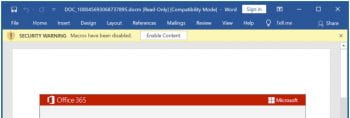Phishing is the most common tool used by cybercriminals to steal login credentials, personal information, data, and intellectual property. If you receive a “phishy” email (i.e., an email that demands unexpected quick action, comes from an unknown sender, asks you to supply login credentials or other personal information, etc.), please protect yourself and others at […]
Category: Social Engineering
Have a Happy (and Secure) Thanksgiving

People across America are preparing to travel over the river and through the wood, visiting friends and family for Thanksgiving. The American Automobile Association predicts more than 53 million people will travel for Thanksgiving this year, an increase of 13% from 2020 and the most significant single-year increase since 2005. Many of us are eager […]
Bonus Scam of the Month: Emotet Attachment Scam

The Information Security Office recently became aware of the reemergence of a malware distribution network previously taken down by law enforcement. This phishing email may look like a reply from a previous familiar email chain. This malicious phishing email uses three types of email attachments to install malware. These attachments include: Microsoft Excel spreadsheets Microsoft […]
Scam of the Month: Direct Deposit Phishing Scam Impersonating University Leadership

Members of the WashU community are receiving phishing emails impersonating university leadership, including Chancellor Martin and Dean Perlmutter. These messages request changes to direct deposit information due to suspicious activity. Phishing scams often impersonate people in leadership positions to encourage a heightened sense of urgency in the recipient. Additionally, information about leaders is publicly available […]
He Held Her Hostage with His Words
Bonus Scam of the Month On Father’s Day, 2021, Jaime Bardacke, a licensed clinical social worker in San Fransisco, received a phone call from a man who identified himself as Lt. Timothy Reid of the San Mateo County Sheriff’s Office. Initially, Bardacke was not surprised by the call. She had dealt with legal issues involving […]
Scam of the Month: DocuSign Phishing

Attackers continuously adjust their tactics to circumvent our defensive strategies, using new methods to access our systems, data, and personal information. Even as attackers develop new scams, one element seems to carry on—impersonation. Our office frequently publishes about impersonation because it forms the basis of most phishing attempts. Often, attackers impersonate a high-ranking employee in […]
The Race Against Ransomware

Ransomware is a specific category of malware that causes harm to the computer and the computer system. The U.S. Cybersecurity and Infrastructure Security Agency defines ransomware as “an ever-evolving form of malware designed to encrypt files on a device, rendering any files and the systems that rely on them unusable.” The threat actors (hackers) behind […]
Cyberattacks are speeding up

Organizations have been a driving force behind cybersecurity awareness and training. It’s more important than ever to be up to date with cybersecurity knowledge so that attacks don’t happen on your watch. In these special edition Cybersecurity Awareness Month articles, you’ll read about damaging attacks that happened in 2021 — and how employee actions changed […]
How to use your source-checking skills to stay safe from phishing
By Harrison Stites According to IC3, an FBI subsidiary, 241,342 Americans were victims of successful phishing attacks in 2020. The tactics used in phishing continue to evolve with the intent of getting you to divulge sensitive information or download malicious attachments. However, you already possess the skills to prevent phishing attacks and stay safe online. […]
Phishing 101
Email phishing has long been the method of choice for many cybercriminals who seek to exploit vulnerabilities for personal gain. These attacks are continually revised and refreshed to take advantage of current trends and new strategies used to socially engineer their victims. Phishing works so well because it takes advantage of human emotion, convincing unsuspecting […]
Scam of the Month—June 2021
In each issue of the newsletter, we will feature, discuss, and dissect a scam that has appeared on our campus. These scams are “real” attempts to infiltrate our systems and/or gain access to sensitive and personal information of individuals in our community. By sharing these examples with our readers, we hope to enhance your awareness […]
Social Engineering Red Flags
Phishing, the practice of sending fraudulent emails in order to induce recipients into surrendering private information and login credentials, is the single most common type of cybercrime today. According to a recent report by the Federal Bureau of Investigation’s Internet Crime Complaint Center (IC3), nearly one-third of complaints received in 2020 were about various forms […]
Phishing Alert: Tax Scam Targeting Educational Institutions
The Internal Revenue Service (IRS) issued a warning today (Tuesday, March 30, 2021) about an ongoing impersonation scam targeting educational institutions. Faculty, students and staff with email addresses ending in .edu are primary targets for this scam. How this Scam Works This criminal scam attempts to capture personal information from recipients by prompting them to […]
Keep Your Information Secure This Tax Season
Tax season is here again, and as always, that means internet scammers are looking for openings to take advantage of heightened online traffic. According to IRS Commissioner Chuck Rettig, “This is generally the hunting season for online thieves, but this year there’s a dangerous combination of factors at play that should make people more alert” […]
InfoSec Alert: Social Security Vishing on Campus
Our office received a report of a vishing (fraudulent phone call) attack targeting a WashU student. In the attack, the caller claimed that the student’s social security number had been associated with overseas drug-trafficking activity. Another popular Vishing campaign involves impersonating support personnel from companies like Apple or Amazon. In this scam, the attackers call […]